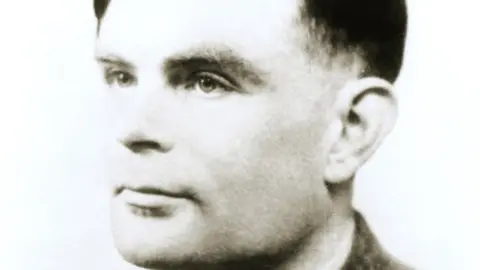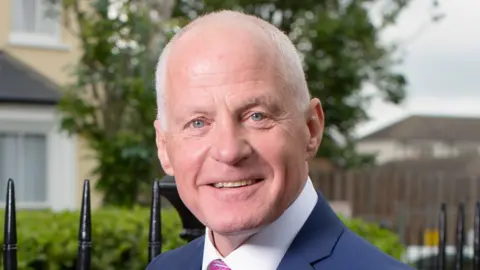Pardons extended to all abolished same-sex crimes
 Getty Images
Getty ImagesMore people will be eligible for a pardon for historical criminal convictions relating to homosexual activity, the government has said.
It means anyone convicted or cautioned for consensual homosexual activity, under now-abolished laws, can apply to have them "disregarded".
The convictions would be wiped from record and an automatic pardon given.
The home secretary said she hoped the revised scheme "would go some way to righting the wrongs of the past".
Since 2012, people in England and Wales have been able to apply to have historical same-sex sexual cautions and convictions disregarded.
And in 2017 so-called "Turing's Law" was passed - named after the wartime codebreaker Alan Turing who was convicted of gross indecency for homosexual acts. It granted automatic posthumous pardons to others who were convicted of sexual acts that are no longer deemed criminal.
However, campaigners have argued the crimes covered by the scheme are too narrow.
 Science Photo Library
Science Photo LibraryThe current law only covers nine former offences included on a specified list, largely focused on the repealed offences of buggery and gross indecency between men.
Campaigner Lord Cashman has previously highlighted how the offence of solicitation by men, which he said "was used to entrap gay and bisexual men, sometimes for doing nothing more than chatting up another adult man", is not included in the original scheme.
Earlier this year, fellow peer Lord Lexden said it was "an affront to gay people" that the scheme had not been extended.
The government intends to use an amendment to the Police, Crime, Sentencing and Courts Bill to broaden eligibility for a pardon.
In the future, the scheme will encompass any repealed or abolished civilian or military offence which was imposed on someone purely for, or due to, consensual same-sex sexual activity.
The amendment will also enable those who have died prior to the amendment coming into force, and within a year after the amendment comes into force, to be posthumously pardoned.

Home Secretary Priti Patel said: "It is only right that where offences have been abolished, convictions for consensual activity between same-sex partners should be disregarded too.
"I hope that expanding the pardons and disregards scheme will go some way to righting the wrongs of the past and to reassuring members of the LGBT community that Britain is one of the safest places in the world to call home."
Lord Cashman, Lord Lexden and Prof Paul Johnson, who also worked on the campaign, welcomed the news.
In a statement, they said: "Parliament has a duty to wipe away the terrible stains which they placed, quite wrongly, on the reputations of countless gay people over centuries."
David Bonney, who was convicted of homosexual conduct while serving in the RAF in 1993, thinks he was the last person in the UK to be sent to jail for being gay.
Being gay remained an offence in the armed forces until 2000.
 David Bonney
David BonneyMr Bonney served four months of a six-month sentence in a military prison in Colchester before he was freed on appeal.
"They've got the records, they know who we are," he said.
"There are only 2,000 of us. This could be sorted within a couple of years."
